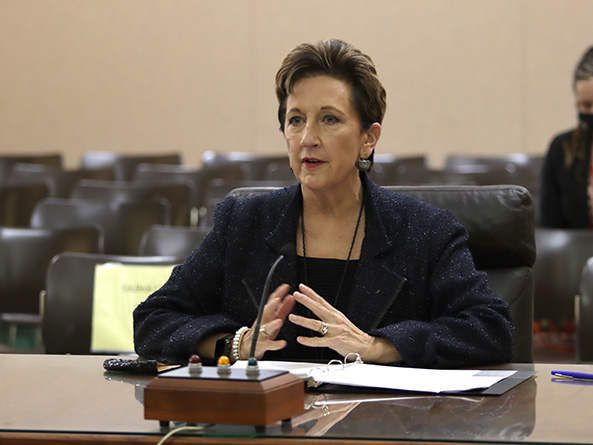Sexual assault, sex trafficking identity protection considered
The identity of an individual alleging sexual assault or sex trafficking would remain confidential in the period immediately following a reported crime under a bill heard by the Judiciary Committee Feb. 3.

LB1246, sponsored by Lincoln Sen. Patty Pansing Brooks, would require attorneys and criminal justice agencies to withhold any personal identifying information of an alleged victim from the public record until charges are filed. Under the bill, relevant information could be shared between criminal justice agencies, attorneys and victim advocacy agencies under certain circumstances.
Pansing Brooks said the most frequent reason an individual doesn’t report crimes of sexual violence is the fear of retaliation. The state should create an environment where victims feel safe to come forward, she said, to protect themselves and others.
“When identifying information of victims in these cases is available to the public, it can leave them vulnerable to intimidation, threats or harm,” Pansing Brooks said. “There have been instances in Nebraska where victims of trafficking have been physically harmed or received death threats from their traffickers after reporting to law enforcement.”
Under LB1246, an individual’s identity could be released if he or she waives their right to confidentiality or dies as a result of their abuse or if charges are filed against an alleged perpetrator. An alleged victim’s identity also could be released as part of a child abduction alert system.
In support of the bill was Molly Nocita, an advocate for survivors of sex trafficking. She said LB1246 would provide time for an individual to heal, seek justice and move forward.
“In abusive situations, the most dangerous time for a victim is when a person attempts to leave,” Nocita said. “If the perpetrator sees the victim’s name on a public report, what’s to protect them from further abuse?”
Capt. Tracy Scherer testified in support of the bill on behalf of the Omaha Police Department. Individuals who report an assault may be contacted by the local media, Scherer said, which can impact their ability to participate in an investigation and may alert a suspect that an investigation is being conducted.
Glen Parks, coordinator for the Nebraska Human Trafficking Task Force, also spoke in support of the bill on behalf of the Nebraska Attorney General’s Office. LB1246 would help mitigate the fear of retaliatory violence that keeps victims from coming forward, he said.
Jo Giles, executive director of the Women’s Fund of Omaha and board member of the Nebraska Journalism Trust, testified in support of LB1246. She said the bill could alleviate embarrassment for an individual making an allegation by limiting contact from unwanted parties — such as the media — when they are at their most vulnerable after filing a report.
“While it’s best practice [for journalists] not to publish or report the names of minors, there can be inconsistencies with adults,” Giles said. “LB1246 would provide confidentiality for victims while not jeopardizing journalistic efforts.”
No one testified in opposition to the bill and the committee took no immediate action on it.


